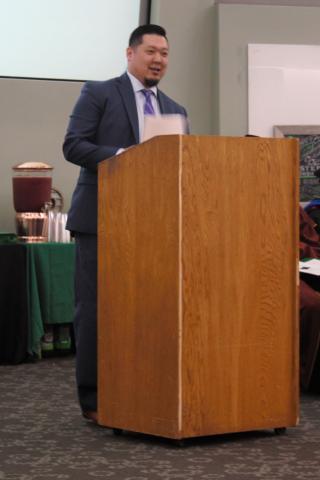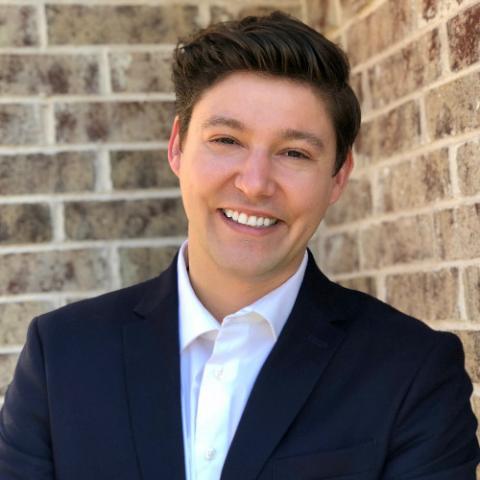COMM Alumni recognized at department graduation ceremony
May 14, 2019
COMM Alumni recognized at department graduation ceremony
COMM alumnus Bryan Lysinger (B.A. 2010; MA 2014) served as keynote speaker at the department's Spring 2019 Senior Recognition and Master's Hooding Ceremony on May 10, 2019. In addition to offering an inspirational speech, Lysinger was also recognized by the department as "Alumni of the Year." Lysinger, a U.S. Army veteran, currently serves as an advisor for Soulier Financial Group. Please see below for the text of Lysinger's speech.
During the ceremony, the department also recognized alumnus Sam Gist (B.A. 2009; MS 2013) with its inaugural "Outstanding Alumni Pedagogue Award." This award is bestowed upon department alumni who demonstrate excellence in pedagogy, education innovation, and a commitment to higher education. Gist, who has served as a teaching assistant and adjunct faculty member for the Communication Studies department, currently serves as Associate Director for the Center for Learning Experimentation, Application, and Research at UNT.
Bryan Lysinger speech:
Dress for the job you want, not the one that you have; think outside the box; synergy; Bring your A game; User-Centered; return of investment; Integrated approach; boots on the ground; paradigm shift; low-hanging fruit, Tee it up; take it to the next level, synergy
Your business cliché education is complete. Now go, give it 110%
Renowned masters and astute graduates, take a look at your family, friends, these distinguished and outstanding individuals up here, and you, only you, give a round of applause to the support system that helped guide you through this journey. Next, close your eyes, take a deep breath, and relish the feeling of having stayed the course, of being here today. Now make an effort not to breathe frantically as you visualize trying to navigate the cluster of where your life goes from here. Something you've probably been doing for weeks.
I hear a lot of people talk about adulting, and the terrible woes that stem from such an affliction. My very privileged response is usually, you're just not adulting right. Sure, there are drawbacks; paying bills, bad work schedules, unbearable responsibility. But you also have the freedom, the agency, to eat cake for breakfast, to binge watch 7 seasons of Game of Thrones in a week, or to jump in your car in the middle of the night just to enjoy the night air with the windows down and the volume up without any fear of reprisal. Like I said, a very privileged response.
So how then do we define "adulting"? Is it the ability to provide, for ourselves and others? I know many folks who provide for their families but would be hard pressed to say they adult very well. A young child can provide for the emotional needs of a parent; they shouldn't have to, but they can. Is it fame or influence? Again, I would be hard pressed to say that our celebrities have mastered adulting. And so to define adulting, I look toward reflexivity. To be reflexive is to understand and empathize with how you, as a person, affect others and the world around you. Empathy is key to this definition. To feel as others feel, because many of us stop at understanding. So if reflexivity is the ability to understand and empathize with how you affect others, then for me, adulting is the action, the work, resulting from reflexivity. There is a big gap between understanding mental health and taking the steps to ensure yours is healthy. It is one thing to understand what oppression is. It is another to empathize with the fear, desperation, and anger of the oppressed. And it is an entirely different thing to make changes, to do work, based on that empathy and understanding.
This isn't to say that you have to turn that work into a career. As far as I know, adulting isn't a career choice. I have had numerous conversations with friends and colleagues about the immense relief they've felt in working the standard 9-5 and having the freedom to pursue their passions for advocacy without the need to have their metaphorical foot back in the office door. You do not need to have CEO on your office door or a job with an advocacy group to be an advocate, a leader, or to enact change. It starts with one instance of adulting and progresses from there.
You've all taken Comm 1010 and Comm 3010 so you know we view the world through lenses. And I'm sure that those lenses have, for many of you, like me, ruined every form of media. So thank you to our esteemed faculty for that soft skill set. I/O lenses, rhetorical lenses, performative lenses. Enough lenses that you should have double majored in optometry and obtained a STEM degree like your parents wanted.
But I interact with the world as a cis gendered, heterosexual, middle class Christian male. No matter how much work I do or how much I learn, I will always view the world through that lens, and I will always be able to retreat to my privilege when it serves me to do so.
My actions, my words, they are perceived by others through their own lenses; and as such I do not get to label the effects of those words and actions. I do not get to label my own work. The same holds true for each and every one of you. Mandy Cowley, both my cousin-in-law, and an amazing writer and advocate for marginalized groups, states, "You do not get to label your own actions, and to think so only comes from a position of privilege." Privilege you can retreat into when the stakes get too high. As you move forward, both professionally and personally, she asks that you consider these 3 things:
- First, what you are willing to risk for the sake of a cause. If you are not willing to "go to the mat" on an issue, if you are not willing to actually risk something of value, even if that is simply your emotional comfort, are you really an ally? There are lots of ways to get involved and many of those do not feel safe and comfortable, but marginalized people desperately need those in positions of privilege who are actually willing to risk something.
- Second, examine whether your title as a "manager," "partner," "parent," "ally," or whatever you aspire to be known as has become more performative than it has substantive. If you can't remember the last time you felt truly afraid, uncomfortable, or vulnerable then you might need to examine the work you are doing. That looks different for everyone. What might feel uncomfortable or scary to one person might not feel that way to another person. I am not saying that you need to literally risk your life for every cause BUT I am saying you need to consider if you are willing to risk anything for a cause or if your comfort is more important.
- Third, stop worrying so much about being seen doing the work and spend a lot more time actually doing the work. It doesn't matter if anyone ever sees the effort you put in, as long as you are enacting change.
When I look at the people in our country who hold power, who hold prestigious titles, I don't think adulting is one of their fortes. Are they great at their jobs, at making money, at amassing power? Absolutely. But are they doing work with true understanding and empathy for those they have power over? I don't know. But until we can answer that question with a resounding yes, you are called to do better. Titles are nice, but remember, when it comes to adulting, the title doesn't matter. Not job titles, not relationship titles, not dressing for the job you want, not the synergies, not the return of investment, and not the title of ally. The work matters. So get out there, and do the work.

